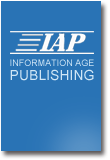
Distance Learning
Volume 13 #1
Edited by:
Michael Simonson, Nova Southeastern University
Charles Schlosser, Nova Southeastern University
John G. Flores, United States Distance Learning Association
A volume in the series: Distance Learning Journal. Editor(s): Michael Simonson, Nova Southeastern University.
Published 2016
Distance Learning is for leaders, practitioners, and decision makers in the fields of distance learning, e'learning, telecommunications, and related areas. It is a professional journal with applicable information for those involved with providing instruction to all kinds of learners, of all ages, using telecommunications technologies of all types. Stories are written by practitioners for practitioners with the intent of providing usable information and ideas. Articles are accepted from authors - new and experienced - with interesting and important information about the effective practice of distance teaching and learning.
Distance Learning is published quarterly. Each issue includes eight to ten articles and three to four columns, including the highly regarded "And Finally..." column covering recent important issues in the field and written by Distance Learning editor, Michael Simonson. Articles are written by practitioners from various countries and locations, nationally and internationally.
Distance Learning is an official publication of the United States Distance Learning Association, and is co‐sponsored by the Fischler School of Education at Nova Southeastern University and Information Age Publishing.
CONTENTS
FEATURED ARTICLES
The Keys to Online Learning For Adults: The Six Principles of Andragogy, Part II Wendy Conaway and Barbara Zorn‐Arnold
The CreationStation: An Innovative Approach for Producing Instructional Technology and Distance Education, Rafael Giraldo
Improving Distance Education for Disabled Students: Making the GRADE, Marilyn A. Goodrich
Introducing Distance Learning into Jamaica’s Technical Vocational Education and Training System: Strengths, Weaknesses, Opportunities, and Threats, Roxanne Hinds
Georgia Virtual School: Student Success in a Computer‐Generated World, Valencia H. Ingram
Do Personal Response Systems Improve Learning? Steven E. Gregor and Gregory B. Muscelli
COLUMNS
Ends and Means
Resources and Factors to Consider When Designing New Online Programs ‐‐by Natalie B. Milman
Try This
A Surging Education Sector: Online Learning for High School Through College —by Errol Craig Sull
Ask Errol! —by Errol Craig Sull
And Finally ...
Assumptions and Distance Education —by Michael Simonson

- EDU000000 - EDUCATION: General
- EDU041000 - EDUCATION: Distance & Online Education
- EDU037000 - EDUCATION: Research
-
 (Re)Envisioning Social Studies Education Research
Current Epistemological and Methodological Expansions, Deconstructions, and Creations
(Re)Envisioning Social Studies Education Research
Current Epistemological and Methodological Expansions, Deconstructions, and Creations
-
 Designing and Teaching Online Courses During Uncertain Times
A Special Issue of Distance Learning Ends and Means Columns, Distance Learning - Volume 17 #4
Designing and Teaching Online Courses During Uncertain Times
A Special Issue of Distance Learning Ends and Means Columns, Distance Learning - Volume 17 #4
-
 Distance Learning
Volume 20 #3
Distance Learning
Volume 20 #3
-
 Distance Learning
Volume 20 #4
Distance Learning
Volume 20 #4
-
 Distance Learning
Volume 19 #3
Distance Learning
Volume 19 #3
-
 Distance Learning
Volume 19 #4
Distance Learning
Volume 19 #4
-
 Distance Learning
Volume 20 #1
Distance Learning
Volume 20 #1

